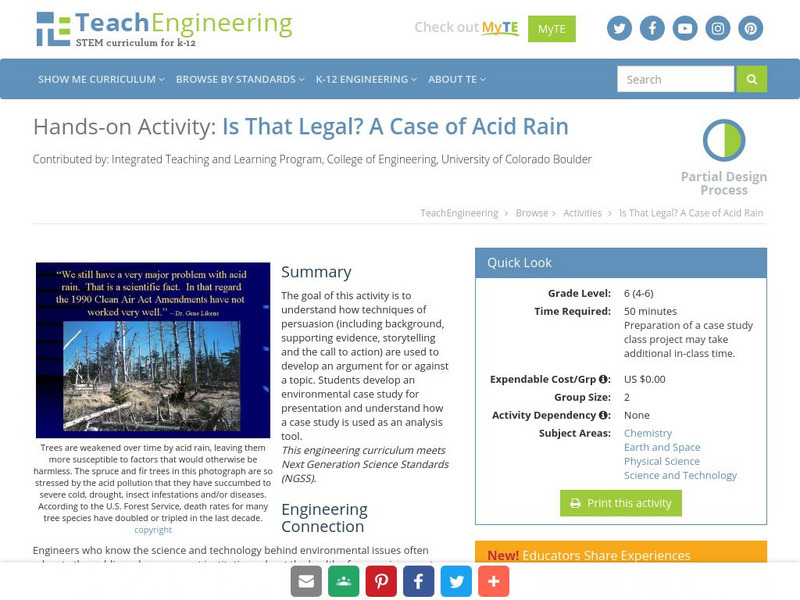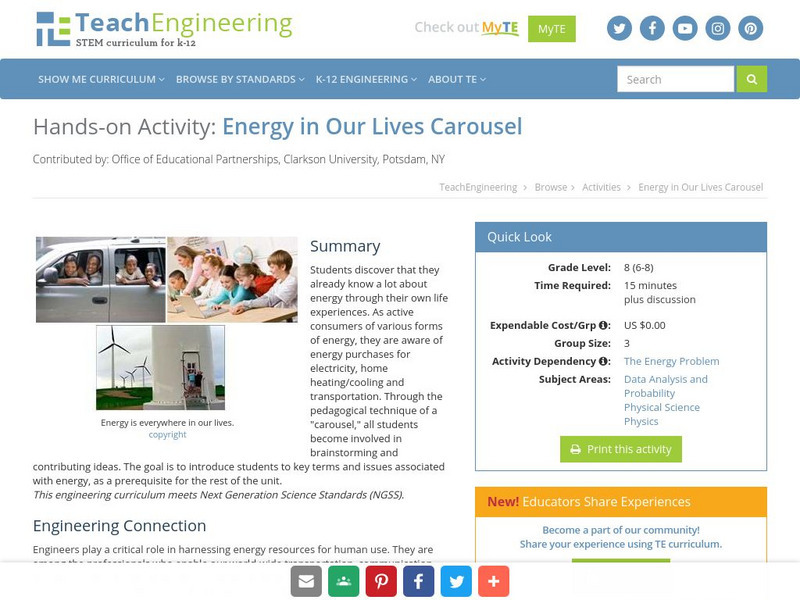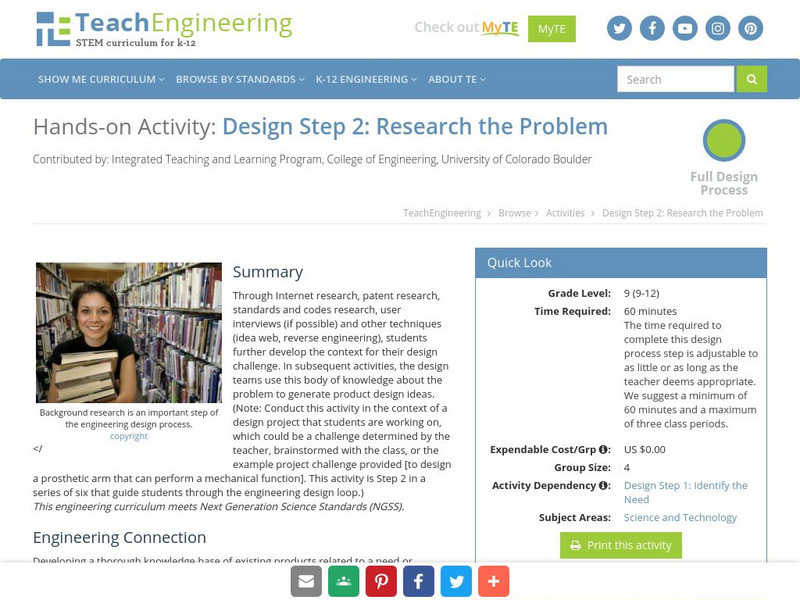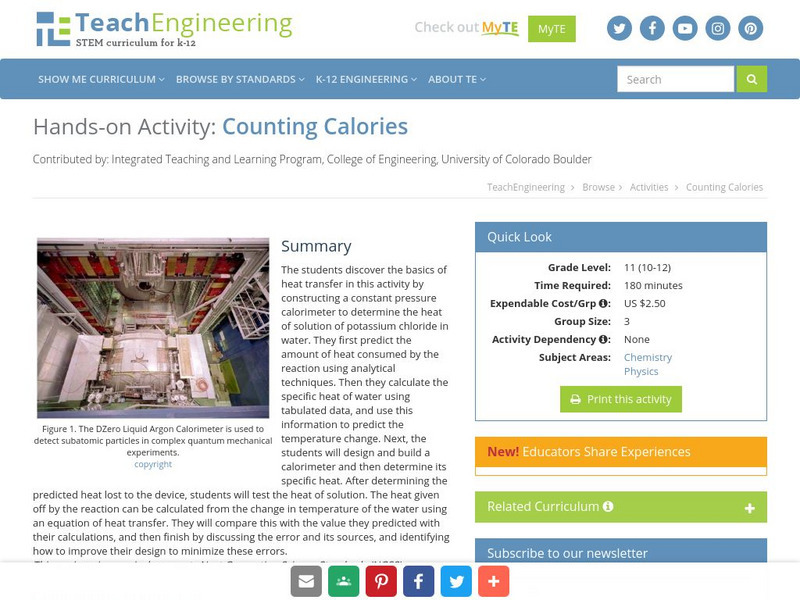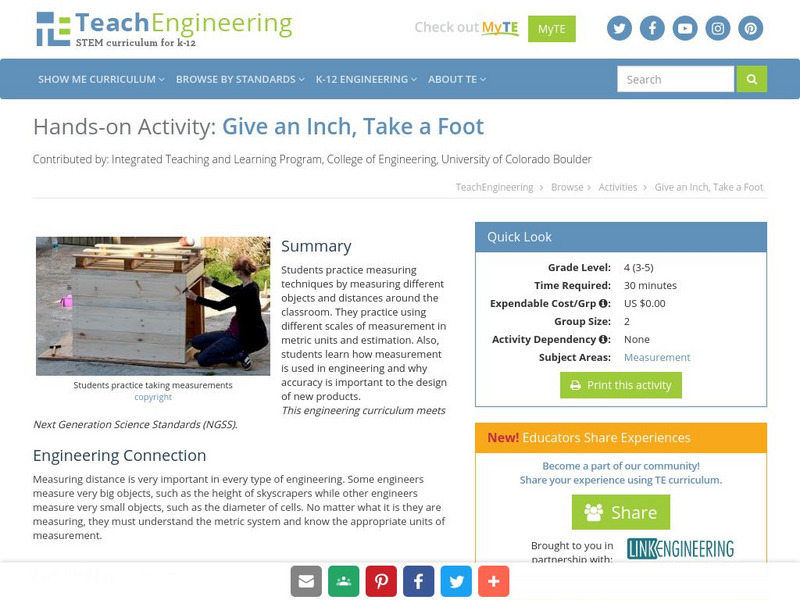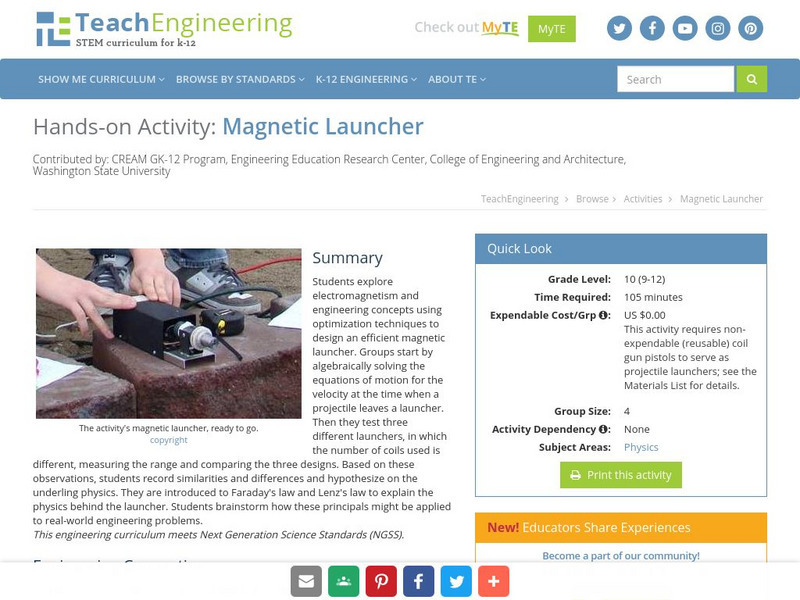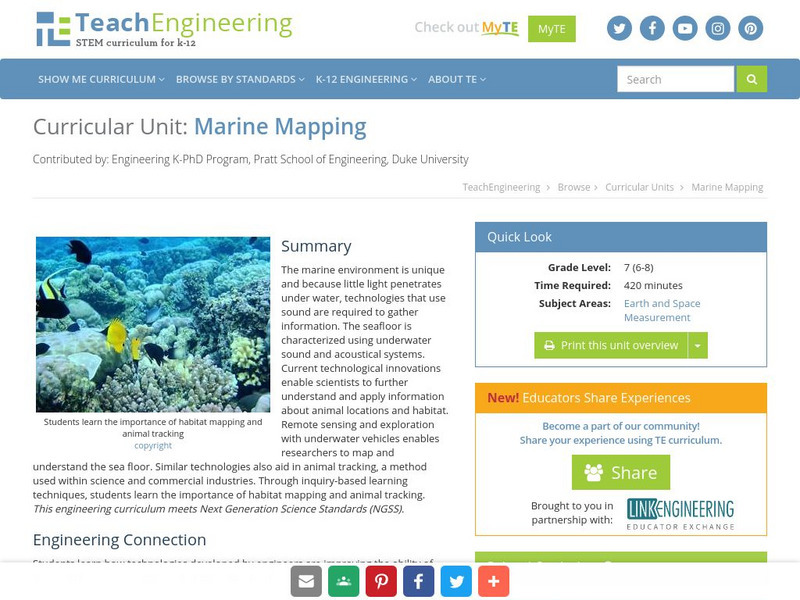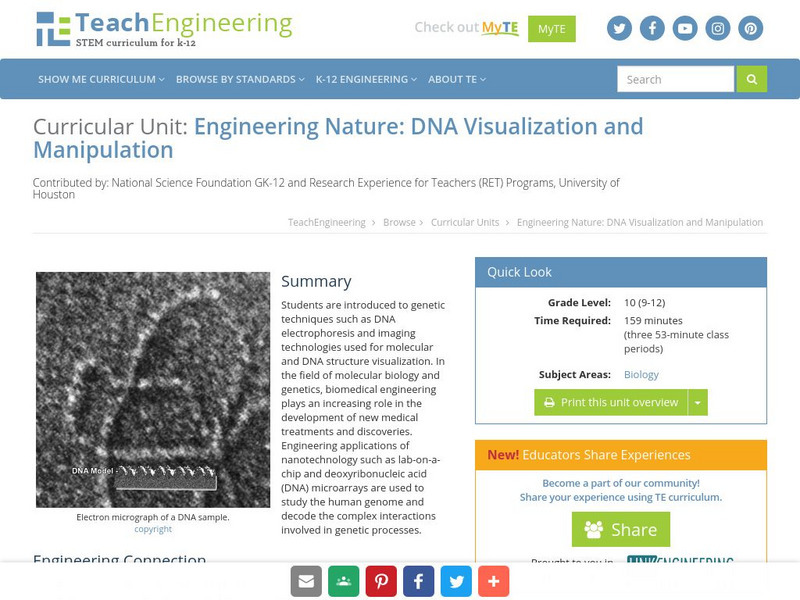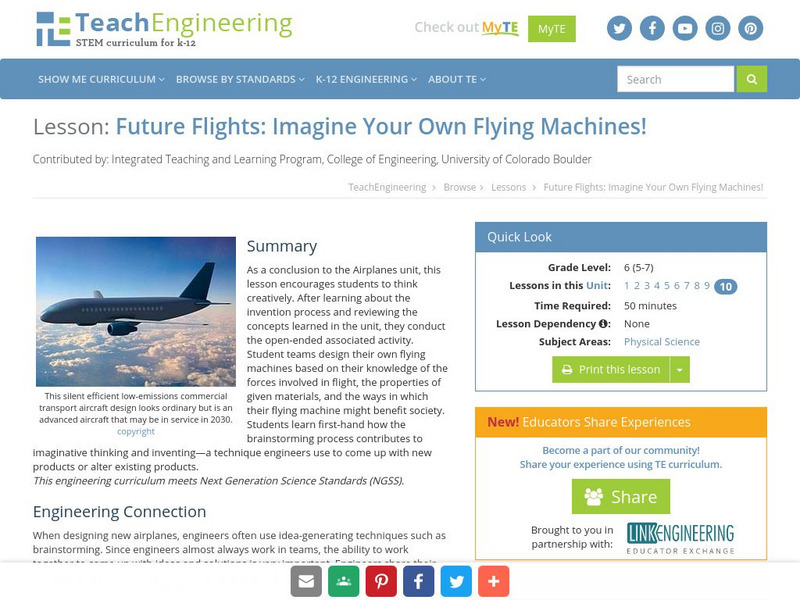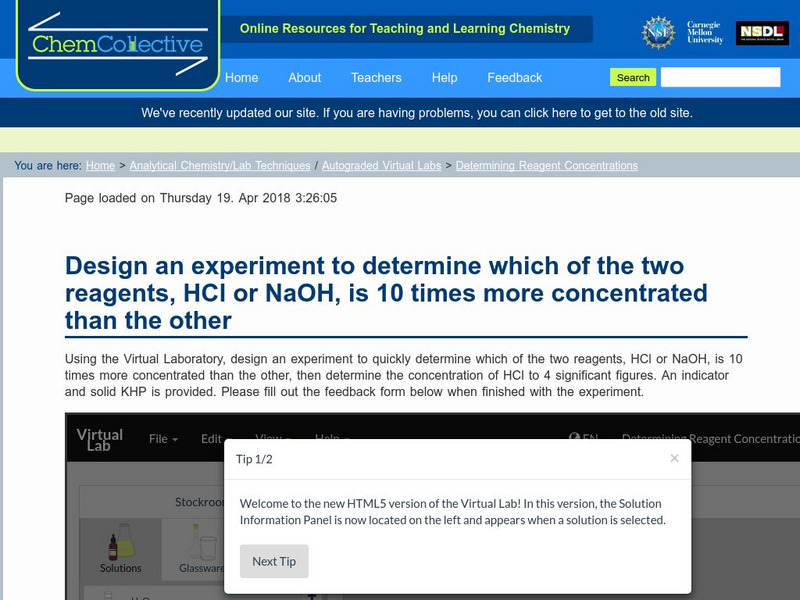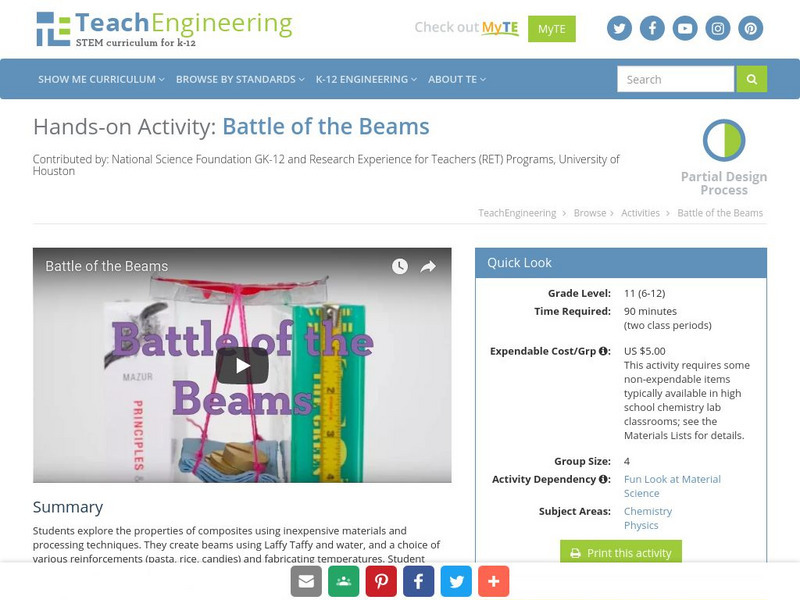Science Education Resource Center at Carleton College
Serc: Physical and Chemical Properties of Water
In this lesson students will understand the difference between chemical and physical properties by studying the properties of water. Students will also understand how to perform the different laboratory techniques that go along with the...
TeachEngineering
Teach Engineering: Is That Legal? A Case of Acid Rain
The goal of this activity is to understand how techniques of persuasion (including background, supporting evidence, storytelling and the call to action) are used to develop an argument for or against a topic. Students develop an...
TeachEngineering
Teach Engineering: Energy in Our Lives Carousel
This activity is a way for students to discover that they already know a lot about energy through their own life experiences. As active consumers of various forms of energy, they are aware of energy purchases for electricity, home...
TeachEngineering
Teach Engineering: Design Step 2: Research the Problem
Through Internet research, patent research, standards and codes research, user interviews (if possible) and other techniques (idea web, reverse engineering), students further develop the context for their design challenge. In subsequent...
TeachEngineering
Teach Engineering: Counting Calories
The students discover the basics of heat transfer in this activity by constructing a constant pressure calorimeter to determine the heat of solution of potassium chloride in water. They first predict the amount of heat consumed by the...
TeachEngineering
Teach Engineering: Give an Inch, Take a Foot
Students practice measuring techniques by measuring different objects and distances around the classroom. They practice using different scales of measurement in metric units and estimation. Also, students learn how measurement is used in...
TeachEngineering
Teach Engineering: Make That Invisible! Refractive Index Matching
Students determine the refractive index of a liquid with a simple technique using a semi-circular hollow block. Then they predict the refractive index of a material (a Pyrex glass tube) by matching it with the known refractive index of a...
TeachEngineering
Teach Engineering: Grading Congestion
Students construct a model roadway with congestion and apply their knowledge of level of service (LOS) to assign a grade to the road conditions. The roadway is simply a track outlined with cones or ropes with a few students walking...
TeachEngineering
Teach Engineering: Magnetic Launcher
Students explore electromagnetism and engineering concepts using optimization techniques to design an efficient magnetic launcher. Groups start by algebraically solving the equations of motion for the velocity at the time when a...
TeachEngineering
Teach Engineering: Plot Your Course Navigation
In this unit, students learn the very basics of navigation, including the different kinds of navigation and their purpose. The concepts of relative and absolute location, latitude, longitude and cardinal directions are discussed, as well...
TeachEngineering
Teach Engineering: Marine Mapping
The marine environment is unique and requires technologies that can use sound to gather information since there is little light underwater. The seafloor is characterized using underwater sound and acoustical systems. Current...
TeachEngineering
Teach Engineering: Engineering Nature: Dna Visualization and Manipulation
Students are introduced to genetic techniques such as DNA electrophoresis and imaging technologies used for molecular and DNA structure visualization. In the field of molecular biology and genetics, biomedical engineering plays an...
TeachEngineering
Teach Engineering: Environmental Engineering and Water Chemistry
Students are introduced to the fundamentals of environmental engineering as well as the global air, land and water quality concerns facing today's environmental engineers. After a lesson and activity to introduce environmental...
TeachEngineering
Teach Engineering: Future Flights!
This lesson is an exciting conclusion to the airplanes unit that encourages students to think creatively. After a review of the concepts learned, students will design their own flying machine based on their knowledge of the forces...
TeachEngineering
Teach Engineering: Ocean Water Desalination
Learners learn about the techniques engineers have developed for changing ocean water into drinking water, including thermal and membrane desalination. They begin by reviewing the components of the natural water cycle. They see how...
TeachEngineering
Teach Engineering: Mind Bending Gps Occultations
Students learn about the remote sensing radio occultation technique and how engineers use it with GPS satellites to monitor and study the Earth's atmospheric activity. Students may be familiar with some everyday uses of GPS, but not as...
TeachEngineering
Teach Engineering: Maximum Power Point
Students learn how to find the maximum power point (MPP) of a photovoltaic (PV) panel in order to optimize its efficiency at creating solar power. They also learn about real-world applications and technologies that use this technique, as...
TeachEngineering
Teach Engineering: Imaging Dna Structure
Young scholars are introduced to the latest imaging methods used to visualize molecular structures and the method of electrophoresis that is used to identify and compare genetic code (DNA). Students should already have basic knowledge of...
TeachEngineering
Teach Engineering: Separating Mixtures
In this lesson the students will learn how to classify the materials as mixtures, elements and compounds and identify the properties of each group. Also the concept of separation of mixtures will be introduced to the students. Since...
Chemistry Collective
Chem Collective: Determining the Concentration of an Unknown Solution
Using the Virtual Laboratory design, students perform an experiment to determine the concentration of the unknown HCl solution to four significant figures.
Chemistry Collective
Chem Collective: Determining Reagent Concentrations
Using the Virtual Laboratory, design an experiment to quickly determine which of the two reagents, HCl or NaOH, is 10 times more concentrated than the other.
Chemistry Collective
Chem Collective: Standardization of Na Oh With a Khp Solution: Acid Base Titration
Use the Virtual Laboratory to standardize an unknown NaOH solution (approximately 0.2M) to four significant figures via titration with 25.00 mL of a KHP standard solution.
TeachEngineering
Teach Engineering: Battle of the Beams
Students explore the properties of composites using inexpensive materials and processing techniques. They create beams using Laffy Taffy and water, and a choice of various reinforcements (pasta, rice, candies) and fabricating...
TeachEngineering
Teach Engineering: Intro to Engineering
Students are introduced to the basic principles behind engineering and the types of engineering while learning about a popular topic - the Olympics. The involvement of engineering in modern sports is amazing and pervasive. Students learn...



